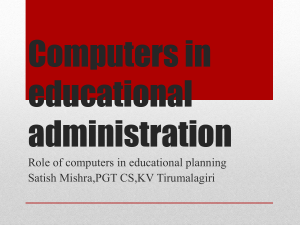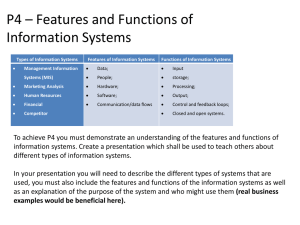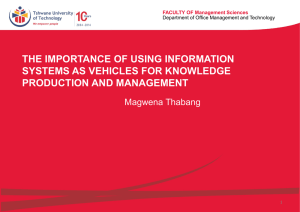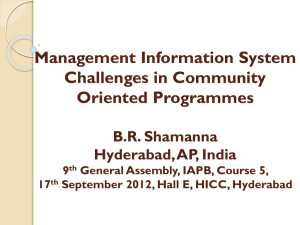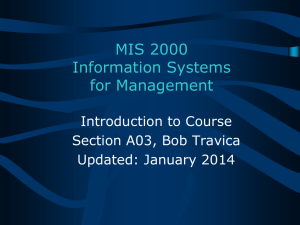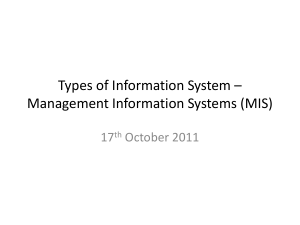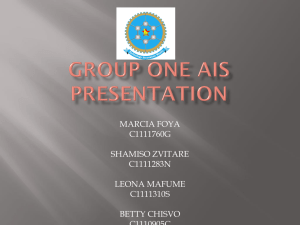All About MIS (careers and tips)
advertisement
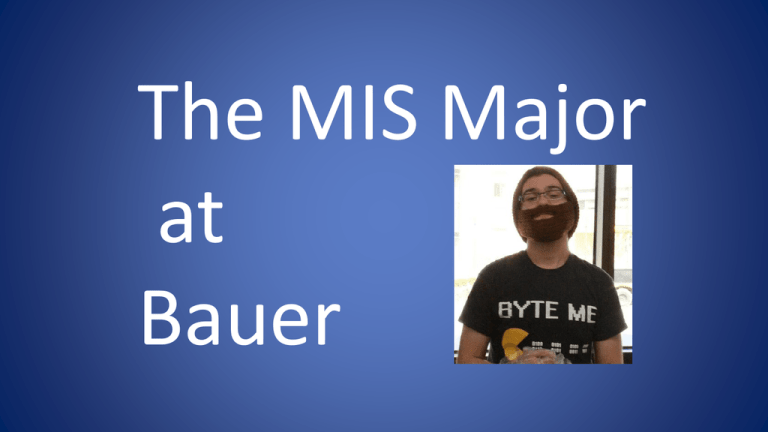
The MIS Major at Bauer In general the MIS major teaches you how to design and build computer systems to: solve business problems and exploit new business opportunities Information systems are rapidly expanding across ALL areas of business. Business computer systems, digital communication, databases are everywhere, at every level of companies. The demand for new systems in the mobile, social media and transaction processing spaces is staggering. Most any career forecast will show MIS-related jobs consistently holding multiple rankings in the "top ten career" choices. Top 3 reasons to be in MIS • Reason #1: MIS is: exciting, interesting and continuously changing: IT IS FUN -NOT BORING • Reason# 2: You get to build profitable things: YOU BUILD NEW SYSTEMS • Reason #3: MIS is a people business: YOU CONSTANTLY INTERACT WITH PEOPLE How to be successful • Perform ...Grades count in the marketplace for entry level jobs. ...Take the ALL the tough courses no wussy courses -- they are a waste of time and money ...Do your work ON TIME (Don't put things off till the last minute) • Get involved … Join the MIS Student Organization (MISSO) • Work hard -- play harder ...You get to be a college student just once. So, have fun now -- a requirement. …You have to make your grades too -- NO Bs or Cs or Ds -- just As. …SO, NO sleeping -- just work hard and play harder. Bachelor of Business Administration Salary Report (Undergraduate) Spring 2014, May 22 2014 Average Starting Salary by Major Bauer College of Business, University of Houston from the Rockwell Career Center MAJOR Management Information Systems Supply Chain Management Finance Accounting Entrepreneurship Marketing Management AVERAGE SALARY AVE $ $62,512 $53,784 $53,481 $50,922 $49.625 $46,700 $40,560 $53,291 JOBS 39 29 34 45 4 20 10 181 Common Tracks and Specialization Track 1: "Business Analyst" (aka "Systems Analyst") -- (50% of grads) This is the typical entry level job description for most MIS majors. The analyst role is a "people skill" role. Typically the tasks are: • Defining user requirements for new systems • Convert the requirements to technical specifications for the application developers • Manage the testing and implementation plans • Co-ordinate training • Post-implementation tasks (maintenance and upgrade planning) Common Tracks and Specialization Track 2 "Application Developer" (10% of grads) The most technical track. Requires skill development in: • Logical program design • User interface design • Database interfaces • Efficiency and scaling • Mobile application development is the "hottest" area in this track. Common Tracks and Specialization Track 3: "Database Administrator" (10% of grads) The incredible expansion of database technology makes this role one of the hottest areas in MIS. Leads to specializations in: • Data Warehousing (how to store data) • Data Mining (how to retrieve data) • Business Intelligence (how to analyze data for profit) • "Big Data" • Collaboration (how to share data) Common Tracks and Specialization Track 4: "Infrastructure and Security" (10% of grads) • Hardware: servers, storage and network communications • Server Administrator • Data Storage Administrator (SANs-- storage area network aka "private clouds") • Networking Administrator – local-area-networks (aka LANs) – wide-area-networks (aka WANs) – private-mobile-networks (aka PMNs or cellular networks) • Everything has to be secure Common Tracks and Specialization Track 5: "Risk Management" (10% of grads) Also an option for accounting majors in the 5-year Accounting program (called “compliance analyst” in MIS departments. • Focuses on technology audits (e.g., Sarbanes-Oxley) • Compliance using frameworks such as COBIT, COSO & ITIL • "Controls focused" -- measure "actual" performance and compares to a "standard" to determine if performance is "in control" or "out of control" • Most placements are with the Big 4 accounting firms "advisory services" groups Common Tracks and Specialization Track 6: “Consulting" (10% of grads) An MIS consultant performs advisory services on virtually all MIS topics: systems development; infrastructure; and strategic planning. The jobs are extremely “challenging” because they require a wide range of skills: both interpersonal and technical. • Extensive travel is often required • Skills have to often be developed quickly to meet the customer needs • After a few years, your ability to manage projects and sell new business becomes critical to your success. • Most projects are of short duration (a few months) and over your career you will see a vast array of companies, problems and solutions. Challenges • Time Management -- grades first, social life second ...there is NO leisure time • College life -- a shared experience … you need to find like-minded colleagues ...Build your social network • Focus on you career placement …do things you can do to assure you get a job ... Professional organizations (like the MISSO) are the most important • Overcoming your fear of complexity. You don't have to have ANY computer skills to become an MIS major ...We will teach you everything you need to know. All that is required is a commitment to learn. Critical Skills Skill #1: Systems Analysis and Design/Project Management How systems are designed, developed and implemented • • • System analysts determine the end-users needs (aka requirements) The system analysts help designs the technical solution and manages the technical team that create the software Then, the users are trained and the system is implemented As a Project Manager (a senior role) you manage: • • • • • • the client (user) relationships; the systems analysts; the technical development team; the trainers; the implementation plan; and most importantly user expectations. Critical Skills Skill #2: Client-server skills (technically -- how the systems are constructed) The Client/sever model (aka 3-tier-architecture) refers to the way most computer systems are built. Client-side (front-end) Browser tools HTML, CSS, XML Server (middle-ware) → Request → Programming Tools: ASP.NET PHP Scripting Reqd. Course: MIS 3371 Transaction Processing I ← Response ← Reqd. Course: MIS 4372 Transaction Processing II Database (back-end) → SQL Request → ← Data Response ← SQL (Structured Query Language) How to talk to a ANY database Database Engines: Oracle Microsoft SQL Server MySQL Reqd. Course: MIS 3376 Database I Currently Most Popular Elective Courses in MIS • Mobile Apps • Cloud and Collaboration • Geographic Information Systems (GIS) • Energy Trading Systems • User Experience Emerging: • Business Intelligence Choosing the right job How do you pick the job once you have some job offers ? Pick the job where you like people you will be working with. Do NOT take a job because: • • • • the pay is good your friends and relatives want you to take a specific job the company has a great name and reputation it is near your home You have to go to work everyday and if you don't like the people environment, no amount of money, prestige or convenience will overcome your misery. Why is one passionate about MIS • • • • • • it is the most fun job you can have AND you can often work from home it pays REALLY well challenging roles continuous learning and MIS -- is a Party in Your Head -- Everyday

